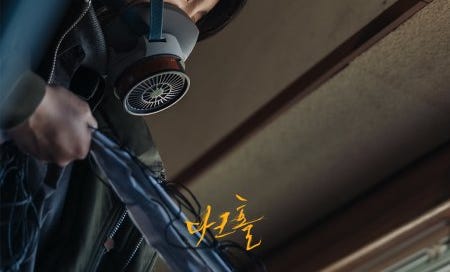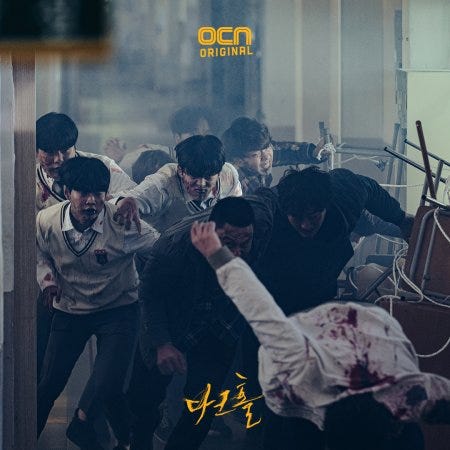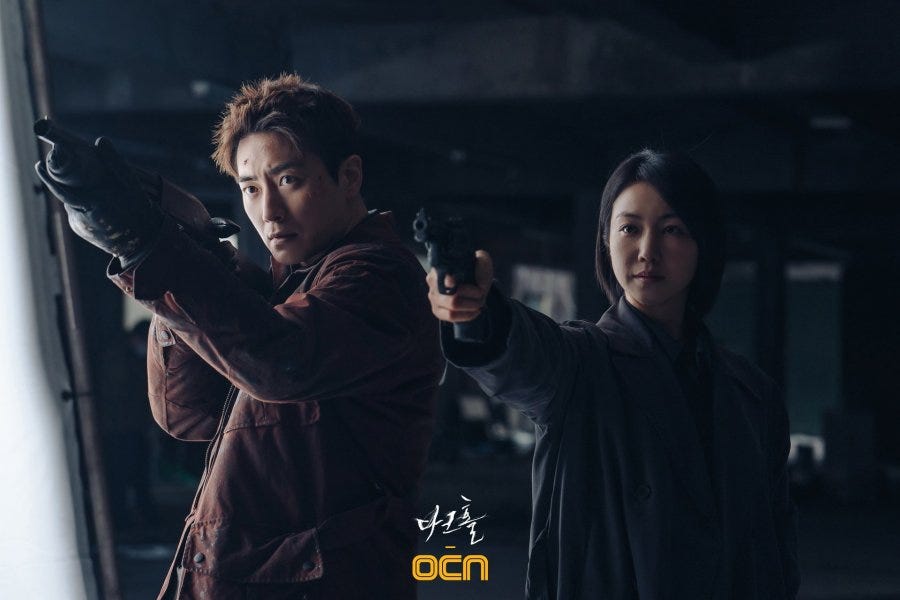Dark Hole (2021) Early impressions and a theory or two
It is regrettable to have to say that this drama is a hard slog and doubly so when the director is miserly in giving us Lee Joon-hyuk moments in these early episodes. Perhaps that will change but since he’s billed as the lead, one expects that he will do more than lead a group of people stealthily around corners playing peek-a-boo with monsters. Kim Ok-vin fares somewhat better as the action hero saving civilians and beating up frenzied mutated souls. In better hands, this could have a profound and poignant psychological thriller after the likes of Sweet Home (2020) but I don’t hold out much hope for that. The storytelling is too pedestrian and the show’s rather overcrowded (although the body count escalates with every episode). The comparisons are inevitable because of decisive thematic overlaps but safe to say, Dark Hole does it own thing much of the time.
So why am I still watching this, 6 episodes later? I’m a sucker for Lee Joon-hyuk for one and for the sci-fi elements that are gradually emerging. It might not be the best of Star Trek or V but it might have just enough of it for me to keep going.
Now that we’re halfway into the show, I’m getting a clearer picture of the motivations behind the black smoke, mutants and mysterious voice. The voice behind the chaos seems to be of extra-terrestrial origin and my hypothesis at this point is that he ( in light of the masculine voice) is running an experiment or test and the residents of Mujin are his lab rats running frantically around the proverbial maze, dizzy from spinning around the rodent wheel. Whether or not this is some kind of precursor to an alien invasion, I can’t say. It might not be. It might only be a means for the extra-terrestrial being to keep humans at bay — manipulating the impressionable, the avaricious and the guilty to exercise control over potentially hostile beings on foreign soil. What makes it especially dangerous is his ability to maintain telepathic connections with specific known targets. The Voice invades their headspace finds the individual’s vulnerabilities and uses it to its destructive bidding. Perhaps he’s having a good o’l time watching them from the sidelines and jeering at these piddly insignificant humans who haven’t a clue what’s just hit them. But it’s clear from Sun-hwa’s ability to resist that he isn’t omnipotent and it gives hope that this entity can be defeated in some way.
I am somewhat fascinated by the religious element to this — how it is used as a mechanism for gaining power and exerting control over souls. Fear is the key… the mind killer in Dunesque fashion. Like Satan of the Bible, the Voice speaks half-truths and offers promises of power to those who are easily swayed because of their deep-seated desires. The shaman gathers a flock of true believers at his behest — those not yet mutated but awed by the power that she has been bestowed. The power is real enough and the attraction to it is all-too-human. Above all else humans are driven to survive at any cost. Betting on the shaman horse is as good as any. Fear makes us fools to tyrants and that’s played out vividly in this drama.
So we’ve seen the ugly side of humanity on display and it’s all sadly familiar. Hence the focus up to this point on those who are morally tainted succumbing to the black smoke because of what’s within. The human impulse is one of self-interest particularly when fear is involved. That’s why both Sun-hwa and Tae-han don’t really appeal to the milk of human kindness but to self-interest to gain compliance from their companions. “What if that was your family member?” This seems to be the most efficient way to prosecute the argument to lend a helping hand in times of need. These surviving strangers are not family certainly but the implication is that they are just as human as family, deserving of the chance to be saved.
Fortunately for Mujin and the rest of South Korea, Sun-hwa and Tae-sul represent the best that humanity has to offer. Time and time again, they lead the way, grit their teeth, put themselves on the line to protect others. This seems to come naturally to them. Not just because one’s a detective and the other an ex-cop. What they have is a moral compass that enables to see a much bigger picture at play away from the pettiness of ego trips and nothingburger conflicts. Another one of their tribe is the school teacher, Choi Seung-tae who is growing in courage and the student Dong-rim. What they also have in common is that they don’t focus on their fear but on what has to be done to save lives.
What makes this show watchable for someone like me is that it remains true to the aims of good science fiction in that it speculates about what could be and delves into ontological, social issues that humans have debated since time immemorial. The potential for something of substance is here amid the anarchy. I just wish it would hurry up and get to the meat of things sooner rather than later.





